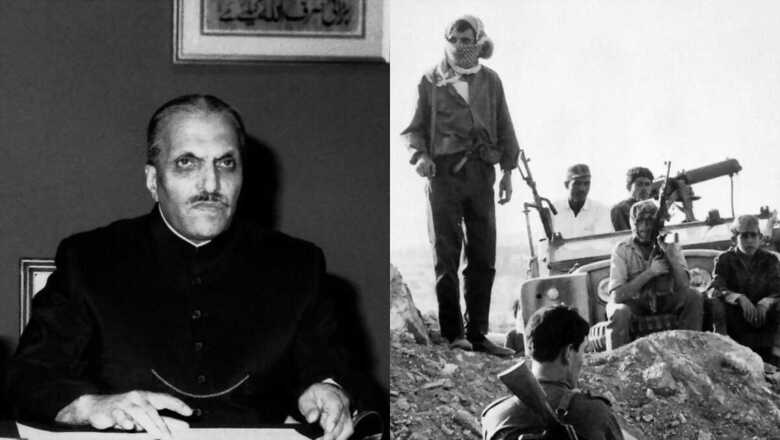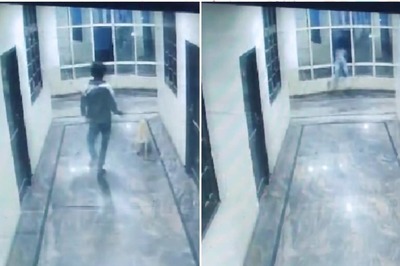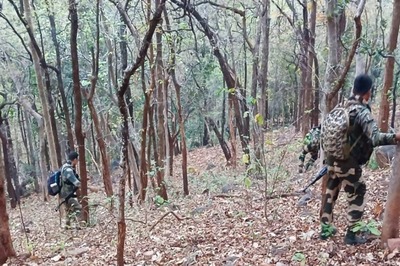
views
Pakistan, a staunch supporter of the Palestinian cause, has equated Israel’s retaliatory airstrikes on Hamas militants to conducting genocide against the people of Palestine.
Caretaker Foreign Minister Jalil Abbas Jilani said there is no doubt that Israel is committing aggression and added, “(Israel) committed airstrikes on the civilian population which killed many Palestinian men, women and children.”
Pakistan interim Prime Minister Anwaar-ul-Haq Kakar has characterized the ongoing violence as “the war between the oppressor and the oppressed.” Pakistan has been a harsh critic of Israel, doesn’t recognise the country and has no diplomatic relations with Tel Aviv.
Though Pakistan portrays itself to be a firm supporter of Palestine, there is a black chapter in its history when Pakistani leader Zia-ul-Haq fought against the Palestinians in 1970 which resulted in the death of at least 3,000 Palestinians.
Jordan Goes Against Palestinian Refugees
Jordan has a significant Palestinian refugee population, with some experts claiming that at least half of the country’s population comprises Palestinians. The Palestinians started arriving in the country following the formation of Israel in 1947 and the 1967 War, when Israel launched attack on several Arab states.
In the 1967 war, around 3,00,000 Palestinian refugees flowed across the Jordan River into new camps around Amman and other cities. The Palestinian fedayeen over the years became an armed state within the state, controlling much of Amman.
The fear of Palestinians destabilising the ruling Hashemite dynasty in Jordan has been for decades. The presence of Palestinian militants led to tension with the government of King Hussein, who ascended to the throne in 1952. Palestinian militant groups like the Popular Front for Liberation of Palestine (PFLP) also launched attacks from Jordan against Israel, triggering retaliation by the Israeli military.
The presence of a significant Iraqi Army contingent, around 20,000 troops and 200 tanks, in Jordan to protect the country against Israel further complicated the situation as both Iraq and Syria supported separate Palestinian militant groups operating in Jordan.
King Hussein was the target of multiple assassination plots in 1970. Following the first assassination attempt, the Jordanian Army attacked the Palestinian refugee camps around Amman.
A second assassination attempt was made against the Jordanian King’s motorcade and the PFLP claimed responsibility for the attack. Few days later, King Hussein ordered the formation of a military government in the country to restore order as clashes with Palestinian militants continued.
Pakistani involvement
In the 1967 war with Israel, Jordan lost the West Bank and East Jerusalem while the Jordanian army and the air force was significantly impacted.
While the US and UK provided Jordan with equipment to rebuild the military, the Jordanian army also benefited from a team of experts from Pakistan that helped reorganize the army, improve its training and prepare it for battle. Among the experts and military leader was also a brigadier named Mohammed Zia-u-Haq. Zia-ul-Haq later rose to become a general and overthrow civilian rule in Pakistan and rule the country from 1978 to 1988.
In September 1970, King Hussein ordered the Jordanian Army to target militants operating from the refugee camps around Amman, in an operation called Black September by the Palestinians. The Syrian tanks entered Jordan in support of the Palestinian militants near the town of Irbid, which was captured by Palestinian militants.
The Palestinian groups PFLP and Democratic Front for the Liberation of Palestine wanted Hussein’s removal and turning Amman into a centre of Palestine revolution.
Bruce Riedel, a former CIA officer, in an article for the CIA website, said Zia-u-Haq was sent to the scene to make an on-the-ground assessment of the situation. The Pakistani leader told the King that Jordan could handle the Syrian tanks using its own forces and Zia took the charge of part of the Jordanian counterattack.
Later, Syria opted to stay out of the hostilities and in the same month, then Egyptian president Gamal Abdel Nasser summoned King Hussein and Arafat and a ceasefire was signed.
Loss of Palestinian Lives and Zia-ul-Haq’s role
In the fighting, that lasted from September 17 to September 27, around 3,000 to 4,000 Palestinian militants were killed, 600 Syrians died or got wounded and the Jordanian army lost 537 lives.
As per reports quoting Israeli military commander Moshe Dayan, King Hussein killed more Palestinians in 11 days than Israel could kill in 20 years.
Black September effectively ended the influence of Palestinian militants in Jordan and led to the ouster of the PLO and other groups from Lebanon.
Though Zia-ul-Haq’s exact role in Black September is debatable, many have called him a ‘butcher’ of Palestinians. Some reports claim that the mandate of the Pakistani military was only training the Jordanian defence forces and the Pakistan forces were not involved in combat.
Other reports said that Ziaul Haq violated the terms of his secondment to the Jordanian army by taking part in the massacre. His troops were accused of being involved in the fighting and killing Palestinians.
















Comments
0 comment